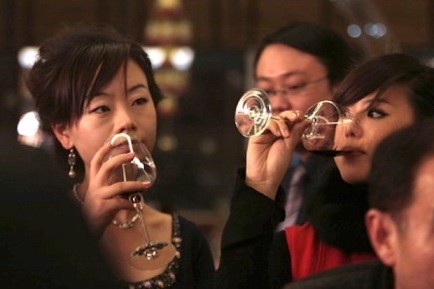Beverage companies in China are hoping to attract women customers to boost their sales, following the sales drop that affected the luxury goods industry including the alcoholic drinks sector, the China Daily reported.
The country's leading baijiu producer, Kweichow Moutai Co. Ltd. has introduced U MEET, a high-grade liquor made from natural blueberry juice, which the company expects will generate about 1 billion yuan ($156 million) to 1.5 billion yuan in revenue in three years.
Yuan Renguo, chairman of the group, said the company is relying on its highly successful brand name to spur sales.
The company said that U MEET, which comes in nine colors and priced at 48 yuan a bottle, aims to target the younger generation who love trendy nightclubs.
China has a female population of about 630 million and leading beverage companies are hoping to lure women consumers, ages 18 to 59, which make up 60 percent of the overall total to enhance sales, the report said.
But global player Diageo Plc. which markets Baileys, a brand popular with women drinkers, has made a strong presence in the market.
"We have also updated the bottle size for Baileys from 750 milliliters to a smaller size, so female customers will find it easy to carry and share with friends at parties or at picnics," Tang Wu, Diageo's brand communications public relations manager, said.
According to the report, Baileys is developing a beverage named Cortado, in collaboration with Costa Coffee, a U.K. coffee chain.
The leading spirits labels such as Diageo and Pernord Ricard, a multinational beverages group based in France, have also affected Chinese companies that produce baijiu, which has 99 percent of market share in the spirits category.
According to a 2014 report released by Mintel Group Ltd., a global market research firm based in the U.K., high-class brands have reduced prices by nearly 50 percent, which had affected China's wine industry despite the fact that the country consumed 155 million cases in 2013, making it the world's no. 1 market.
Mintel also found that certain kinds of alcohol are more attractive to women than men in China, as wine is favored by 71 percent of women compared to 66 percent of men. With champagne, 37 percent of women prefer the drink compared to 30 percent of men, while 33 percent of women prefer cocktails, compared to 26 percent of men.
David Zhang, a senior drinks analyst at Mintel, pointed to the fact that women prefer to drink at home and it is a challenge to tap into the female market.
Zhang added that women consumers look for products that are lighter, sweeter as well as the niche types of alcoholic drinks.
Regarding venues, brands have the rare opportunity to reach to female drinkers in Western-style restaurants.
"Women are more likely to have an alcoholic drink in such venues compared with their male counterparts," Zhang said. "Consequently, brands should benefit from establishing partnership with such venues to offer female consumers an all-around experience."



























